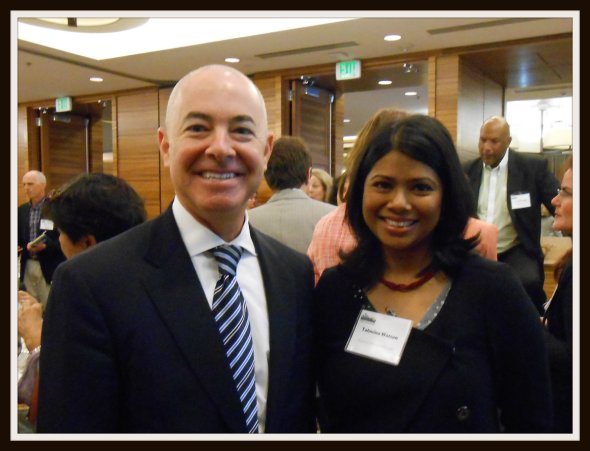 On September 7, 2012, Seattle Metropolitan Chambers of Commerce arranged an immigration meeting with USCIS Director Mr. Alejandro Mayorkas. The meeting title “the future of high-skilled immigration’ was attended by local business leaders, lawyers and others interested in immigration issues for employment-based immigration.
On September 7, 2012, Seattle Metropolitan Chambers of Commerce arranged an immigration meeting with USCIS Director Mr. Alejandro Mayorkas. The meeting title “the future of high-skilled immigration’ was attended by local business leaders, lawyers and others interested in immigration issues for employment-based immigration.
In his keynote speech, the Director discussed some of the issues on which USCIS is currently working. Here is brief summary of some of what he said:
* On the Entrepreneur in Residence program initiative (one my main interests for attending), he said that at the meeting in Atlanta recently, the findings of their EIR analysis were presented and training is underway on these issues. He said that the EIR team is still working to better serve the Start-up community and entrepreneur immigrants.
* On the EB5 front, no mention was made of premium processing. He said that that the focus is to ensure the adjudicating team has the appropriate background to handle such complicated petitions. He said that when he assumed his position, only 9 people were handling all EB5 petitions. He has expanded the team to over 50 individuals at present and is still working on improving that department.
* Regarding RFEs, he recognized that USCIS is sending a lot of RFEs. However, he said that it is the only way USCIS can communicate with the business people.
* Regarding the overall USCIS agency, he said there are significant efforts ongoing to improve the system. There will be a pilot program where there will be direct access to adjudicators. There will also be a pilot of ‘know your customer’ so that adjudicators can develop knowledge about specific companies and their needs.
* He touched on the recent policy update on Deferred Action for Childhood Arrivals.
 Overall, it was a great update on current issues. He said he wants to work on improving the agency for the future in accordance with ‘what people want us to be’. I was hoping to hear a little more about when EIR and when there might be implementation of new policy. There wasn’t much discussion of that. My guess is that we may not hear anything about it until after the election.
Overall, it was a great update on current issues. He said he wants to work on improving the agency for the future in accordance with ‘what people want us to be’. I was hoping to hear a little more about when EIR and when there might be implementation of new policy. There wasn’t much discussion of that. My guess is that we may not hear anything about it until after the election.
After his speech, there was a panel discussion from officials who deal with immigration issues with local businesses, specifically, Microsoft, Expedia, Fred Hutchinson and University of Washington. The consensus was that there are not enough skilled professionals to fill positions yet immigration laws make it difficult to hire people from abroad. So, the positions remain unfilled. Microsoft currently has 6000 unfilled positions, for example. It was discussed that businesses and educational institutions should partner with the government on two things. Firstly, to help develop the next generation to create a STEM workforce as a long term goal, and in the interim, to improve the current immigration system to enable businesses to hire the appropriate personnel so that businesses don’t fail.
 Mr. Robert Feldstein from New York Mayor Bloomberg’s office attended this event and moderated the panel. He said that immigration improvements are necessary now as the ‘consequences are now.’ Mr. Feldstein and Mayor Bloomberg’s office are at the forefront of the fight to help STEM graduates and entrepreneurs stay in the US. I was pleased to see him in person again and very much appreciated the time he took to fly out to Seattle for this event.
Mr. Robert Feldstein from New York Mayor Bloomberg’s office attended this event and moderated the panel. He said that immigration improvements are necessary now as the ‘consequences are now.’ Mr. Feldstein and Mayor Bloomberg’s office are at the forefront of the fight to help STEM graduates and entrepreneurs stay in the US. I was pleased to see him in person again and very much appreciated the time he took to fly out to Seattle for this event.
In conclusion, I was happy to attend this event. I would like to thank the Seattle Metro Chambers for arranging this valuable dialogue and thank the Director for the efforts he made to come to Seattle and meet with us. I hope that we see improvements in the near future.
Here is a link to the Puget Sound Business Journal article on the event.
*Copyright 2012 by Watson Immigration Law. All rights reserved. This material may not be published, broadcast, rewritten or redistributed.
